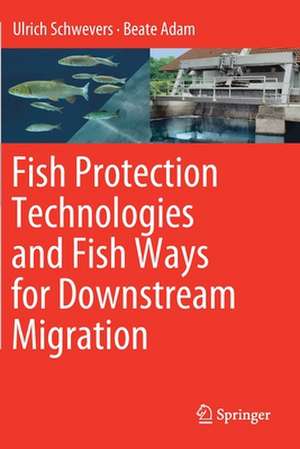Fish Protection Technologies and Fish Ways for Downstream Migration
Autor Ulrich Schwevers, Beate Adamen Limba Engleză Paperback – 14 aug 2020
| Toate formatele și edițiile | Preț | Express |
|---|---|---|
| Paperback (1) | 477.33 lei 17-23 zile | +42.68 lei 7-13 zile |
| Springer International Publishing – 14 aug 2020 | 477.33 lei 17-23 zile | +42.68 lei 7-13 zile |
| Hardback (1) | 732.70 lei 6-8 săpt. | |
| Springer International Publishing – 8 iul 2019 | 732.70 lei 6-8 săpt. |
Preț: 477.33 lei
Preț vechi: 589.29 lei
-19% Nou
Puncte Express: 716
Preț estimativ în valută:
91.34€ • 95.56$ • 75.87£
91.34€ • 95.56$ • 75.87£
Carte disponibilă
Livrare economică 08-14 martie
Livrare express 26 februarie-04 martie pentru 52.67 lei
Preluare comenzi: 021 569.72.76
Specificații
ISBN-13: 9783030192440
ISBN-10: 303019244X
Pagini: 279
Ilustrații: XIV, 279 p. 183 illus., 177 illus. in color.
Dimensiuni: 155 x 235 x 20 mm
Greutate: 0.45 kg
Ediția:1st ed. 2020
Editura: Springer International Publishing
Colecția Springer
Locul publicării:Cham, Switzerland
ISBN-10: 303019244X
Pagini: 279
Ilustrații: XIV, 279 p. 183 illus., 177 illus. in color.
Dimensiuni: 155 x 235 x 20 mm
Greutate: 0.45 kg
Ediția:1st ed. 2020
Editura: Springer International Publishing
Colecția Springer
Locul publicării:Cham, Switzerland
Cuprins
Introduction.- Basic reqirements of fish protection and downstream passage.- Impact of Downstream passability.- Fish protection facilities.- Fishways for downstream migration.- Fish-friendly turbines.- Fish-friendly operational management.- Species-specific requirements.- Habitat measures.- Open questions and knowledge deficits.
Notă biografică
Dr. Ulrich Schwevers is director of the Institute of Applied Ecology (Institut für angewandte Ökologie) in Germany. His interdisciplinary knowledge, notably on river ecology and hydraulic engineering, has enabled him to coauthor several publications with guidelines on fish ways for upstream and downstream migrants. He has travelled extensively in the course of his work and participated in over 300 projects, e.g. in Germany, Switzerland, France and the Netherlands.
Dr. Beate Adam, a freelance fisheries biologist specializing in fish behavior, has more than 20 years of experience observing and researching fish and other aquatic biota under field and laboratory conditions. Educated at several German Universities she has been for more than two decades chairperson of interdisciplinary committees that produced manuals on ecological water engineering. She is author or co-author of more than 200 books, scientific papers, popular articles and reports on freshwater fish.
Dr. Beate Adam, a freelance fisheries biologist specializing in fish behavior, has more than 20 years of experience observing and researching fish and other aquatic biota under field and laboratory conditions. Educated at several German Universities she has been for more than two decades chairperson of interdisciplinary committees that produced manuals on ecological water engineering. She is author or co-author of more than 200 books, scientific papers, popular articles and reports on freshwater fish.
Textul de pe ultima copertă
This book offers a comprehensive review of current systems for fish protection and downstream migration. It offers the first systematic description of the currently available technologies for fish protection at hydropower intakes, including accurate and timely data collected by the authors and other researchers. It describes how to design and test them in agreement with the guidelines established from the EU Water Framework Directive. The book includes important information about fish biology, with a special focus on swimming and migration mechanisms. It offers a robust bridge between concepts in applied ecology and civil hydraulic engineering, thus providing biologists and hydraulic engineers with an authoritative reference guide to both the theory and practice of fish protection. It is also of interest for planners, public authorities as well as environmental consultants
Caracteristici
Offers a practice-oriented reference guide to the design and operation of fish protection and bypass systems for descending fish Describes alternative measures and new turbine types that promise less dangerous passage for fish Discusses the use of early warning systems to guarantee a fish-friendly operation modus of hydropower plants Includes extensive information on the swimming performance of fish and migration mechanisms
